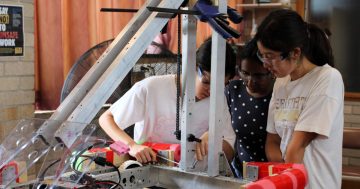Pauleanna Reid* says learning differences should be accommodated in the workplace.
 In the wake of global social justice movements, many organisations have committed to becoming more diverse in their hiring.
In the wake of global social justice movements, many organisations have committed to becoming more diverse in their hiring.
From initiatives to close the gender wage gap to strategies to improve employment equity for POC and LGBTQ+ communities, many companies have made DEI a key part of their business plan.
But even with these efforts to be more inclusive, some underserved communities have continued to be excluded.
This includes the 1 in 5 Americans with learning abilities and differences.
Non-profit organisation, Understood, is driving the conversation and action around inclusion for those who think and learn differently.
Their initiatives include a workplace program that supports professionals with learning disabilities to build meaningful careers and guides employers to create more inclusive HR processes.
Yvonne Cowser Yancy, Chief Administrative Officer at Understood, is spearheading this important work.
With more than 20 years of experience in HR—including founding a boutique HR consultancy and serving as commissioner of HR for the City of Atlanta and Senior VP and Chief HR Officer at Fresh Market—Cowser Yancy is well-versed in what it takes to build more inclusive workplaces.
Alongside her current team, she’s driving change across a number of industries, helping organisations develop HR and DEI policies and strategies that create opportunities for people with learning differences and disabilities to build and maintain thriving careers.
“My experience starting in call centers and working with people across different platforms really prepared me to talk with competence and expertise about how employers actually operate—not the theoretical, but the reality of it and what practical things we can do to help change outcomes for people,” Cowser Yancy said.
Cowser Yancy has two primary goals when working with organisations.
One is to push them beyond simply sharing information in order to build communities that create meaningful change for underrepresented candidates.
The second is to disrupt exclusionary practices, like application processes that don’t offer accommodations for candidates with disabilities and DEI strategies that focus on race, gender, and LGBTQ+ equity but ignore learning differences.
“I think those are two really big things that if they’re not happening in your organisation, then you’re telling people, internally and externally, that it’s not on your list of priorities,” Cowser Yancy said.
Challenging the misconceptions about inclusion
Cowser Yancy acknowledged that there are several pervasive myths about disability inclusion that keeps companies from making the commitment.
Among them is the idea that accommodating candidates and employees with disabilities is about handling ‘outliers.’
But she encourages employers to adjust the way they think about DEI policies.
“Instead of looking through a lens of ‘how do I accommodate one person’s particular challenge,’ the real question I think you should ask in the workplace is how do you make sure that everyone that works for you is fully engaged and has what they need?
Even if you don’t have a difference when you see other people with differences accepted, it makes you feel more connected to the organisation.
It truly benefits everyone,” Cowser Yancy shared.
Another myth Cowser Yancy challenges is the notion that creating accommodating and inclusive spaces is cost prohibitive.
She noted that the average cost of supporting a person with a learning difference or disability is just $500.
Cowser Yancy also shared that there are many low-cost and free ways that employers can accommodate candidates through the interview process and in the workplace.
For example, she pointed to Zoom’s closed caption, chat, and text-to-speech features as easy ways to make virtual interviews more accessible for people with learning differences and disabilities.
She also recommended that employers make it easy for candidates to request accommodations during the application process and prior to their interviews.
“People may not always ask for accommodations, but the fact is, you gave that opportunity which means you’re a space that’s supportive.
And the technology should be joyful.
And, let’s be honest, it’s also cheap.
It does not cost anything on your end other than time and thoughtfulness.
It’s not a financial barrier to create a supportive interview process,” Cowser Yancy said.
For employers who want to dig even deeper with their DEI efforts, Cowser Yancy referenced a number of experts and resources that explore diversity and inclusion from multiple angles.
On racial diversity in the workplace, she recommended David A.
Thomas’s book Breaking Through.
For addressing the gender gap, Cowser Yancy suggested employers explore the work of Ella Bell and Stella M. Nkomo.
And, of course, when it comes to learning differences and disabilities, Cowser Yancy named Understood’s in-house experts like Amanda Morin and James Emmet, as well as the organisation’s extensive resources, including their podcast and app.
‘What are you going to do differently?’
As a leader, Cowser Yancy practices what she preaches, managing her team with their inclusion and success in mind.
Following in the footsteps of the mentors and champions that pushed her forward in her career, she makes it a priority to consider her staff’s needs alongside the organisation’s mission.
“I try to create a space where people on my team have what they need to get their actual work done and a clear line of sight around what their further or their next career objective is.
And I think about assignments and stretch opportunities and how to engage them in ways that are going to help them grow from the seat they sit in.”
Cowser Yancy encouraged employers and managers to think similarly about their approach to DEI and how they can provide space for all people, including those with learning disabilities and differences to have meaningful and successful careers.
“The real question is: what are you going to do differently? Does your space and your organisation reflect the environment you would like for it to have?
“Does it create a space where people who are diverse aren’t just there, but they’re actively included? You have to ask yourselves what the actionable work is.”
*Pauleanna Reid is the founder of New Girl on the Block, a mentorship platform for millennial women who are dealing with major life and career transitions.
This article first appeared at forbes.com.











